
The keto flu
The keto diet is an ultra-low-carb and high-fat diet that restricts total carbohydrate numbers to just 20 or 30 net grams of carbohydrate per day. That’s the equivalent of a single piece of fruit or half a bagel. When you cut carbs, your body’s preferred source of energy, you require your body to suddenly shift to fat for fuel. This raises blood levels of ketones and puts you in a state of ketosis—hence the name “keto diet.” Once this shift, happens, you will lose weight, but you may also have experience so negative side effects. This is commonly referred to as the keto “flu.”
“The keto flu is a very real side effect as the body transitions to a ketogenic diet,” says Suzanne Fisher, RD, LN, in South Florida. “Brain fog, fatigue, dizziness, and insomnia are common with the keto flu.
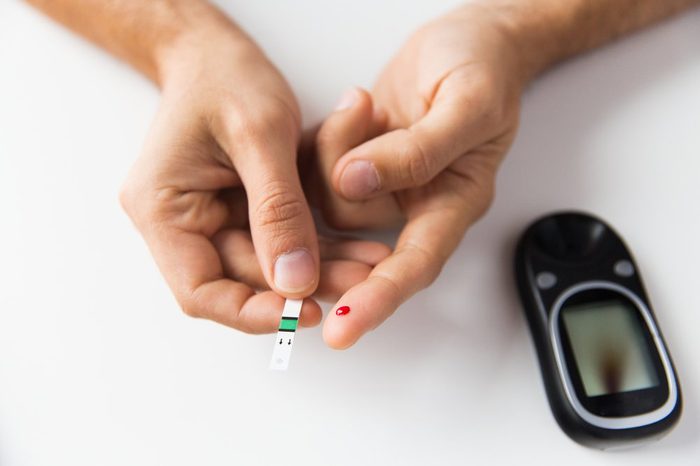
Low blood sugar
Once ketosis is established, most people experience more stable and lower blood sugar levels. Low-carb diets can be an effective way for people with type 2 diabetes to get a handle on glycemic control—and carb monitoring has long been thought to be an effective way to control blood sugar—though one study concluded low-carb diets are not necessarily a better long-term strategy than other diets. Anecdotal evidence abounds from people with type 2 diabetes who have used the keto diet to stabilize their blood sugar and were able to quit taking their diabetes medication. But it’s not recommended that people with diabetes begin the keto diet without first talking to their doctor.
During the first few days of the keto diet, your body will struggle to adapt. You may want to ease into the diet by gradually cutting carbs in the first few days, in order to help your body adjust to fewer carbohydrates. Here’s what everyone gets wrong about the keto diet.

Nutritional deficiencies
The low-carb, high-fat approach to the keto diet limits the types of foods you can have, and entire food groups are eliminated entirely. Beans, legumes, and whole grains are out, as are many fruits and vegetables. Many of these foods carry vitamins, minerals, and other nutrients you can’t get from any other source, and without them, you may start to experience nutritional deficiencies.
“Keto is not a great long-term diet, as it is not a balanced diet,” says Nancy Rahnama, MD, MS, an internal medicine and bariatric specialist in Los Angeles. “A diet that is devoid of fruit and vegetables will result in long-term micronutrient deficiencies that can have other consequences. The keto diet can be used for short-term fat loss, as long as it is under medical supervision.”
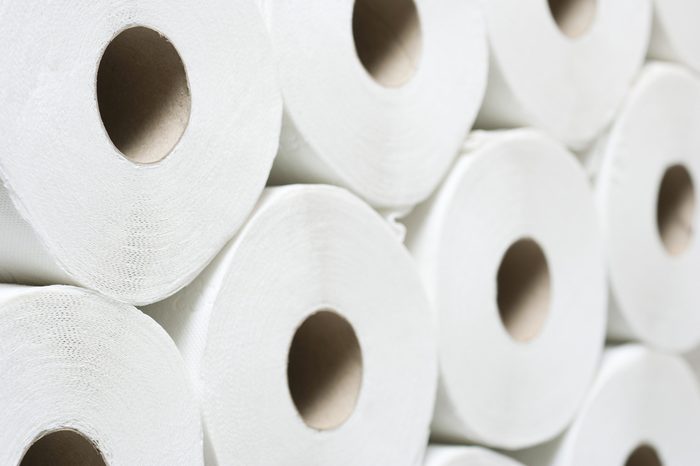
Constipation and bowel changes
Eliminating most fruits and vegetables can have other consequences, too; these fiber-rich foods help keep you regular. Without them, you may begin to experience bowel changes, including difficulty having a bowel movement and eventually constipation.
Luiza Petre, MD, a board-certified cardiologist and weight management specialist in New York City, suggests focusing on eating more low-carb, fiber-rich foods that can help beat this bowel issue. “Try fibrous vegetables, such as broccoli, asparagus, and cabbage, consume more fat like MCT oil, coconut oil, or ghee, and, as always, drink plenty of water,” she says. Also, check out this keto diet menu for beginners.
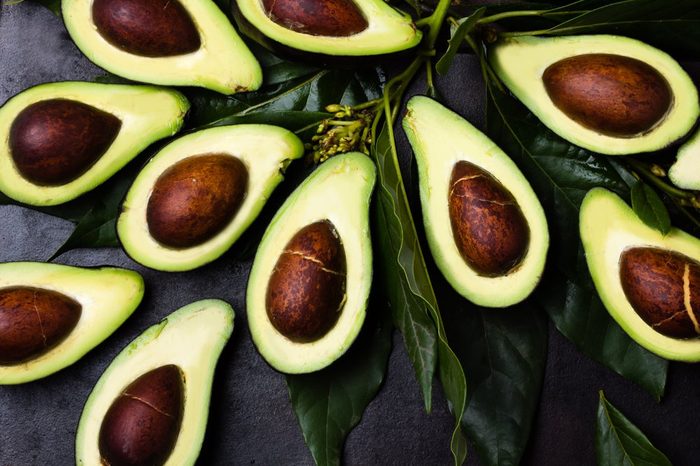
Loss of electrolytes
As ketosis begins, your body will start dumping its stores of glycogen, a substance in your fat and muscles that carries excess weight. This will increase how often you urinate and can lead to an inevitable loss of electrolytes, Dr. Rahnama says. Electrolytes are essential to cardiac function and normal heart beating. “The loss of electrolytes, such as sodium, magnesium, and potassium will put the dieter at risk of a cardiac arrhythmia,” Dr. Rahnama adds.
Look for natural sources of electrolytes or take an over-the-counter supplement. “Avocados, leafy greens, asparagus, and cruciferous veggies are great for providing important electrolytes, says Josh Axe, DNM, DC, CNS, a certified doctor of natural medicine and clinical nutritionist. Dr. Axe also suggests a magnesium supplement to help you sleep and avoid cramps or constipation. Here’s what doctors want you to know about the keto diet.
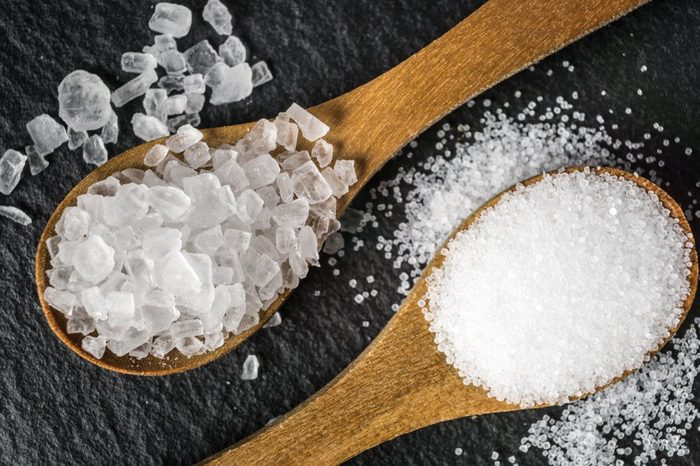
Decreased serum sodium
The average American eats entirely too much sodium, but on the keto diet, you may struggle to eat enough. “One main concern from a dietary standpoint is an increased risk of dehydration and hyponatremia (low blood sodium), especially when exercising intensely in hot environment,” Fisher says. Low levels of sodium in your body can lead to leg cramps, decreased energy, confusion, and even vomiting. “Add a pinch of salt to every meal,” Dr. Petre says. Sea salt is recommended, as it also provides some traces of minerals.
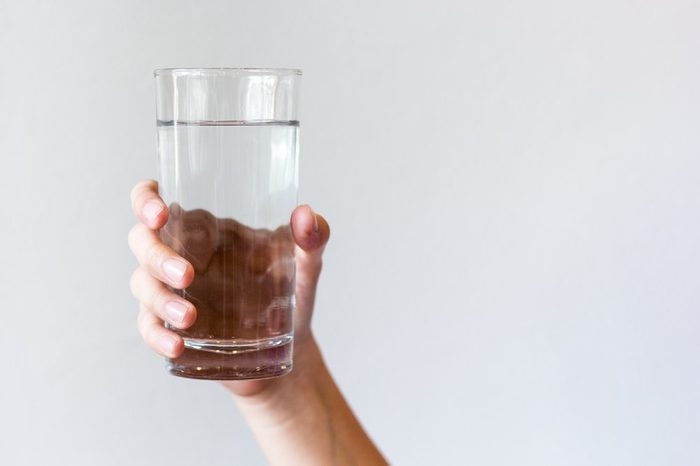
Dehydration
People in the early stages of the keto diet are prone to dehydration issues. “A ketogenic diet is known as a water flushing diet, due to a lessening of inflammation and a reduction of glycogen stores in your muscles and liver,” Dr. Petre says. Dr. Petre suggests preventing dehydration by drinking more water—at least 2.5 liters per day—and starting as soon as you begin cutting carbs in preparation for the diet.
Dr. Axe adds that you should limit caffeine and alcohol, too. While they may be liquids, they aren’t necessarily hydrating. Plus, alcohol adds carbs to your day. Here’s the truth about how long it’s safe to stay on the keto diet.

Kidney stones and kidney damage
If not treated or reversed, dehydration can lead to acute kidney injury, Dr. Rahnama says. That’s not the only way the keto diet can put your kidneys at risk, however. “Kidney stones or damage to the kidney may also be a side effect,” Grace Derocha, RD, a certified diabetes educator and certified health coach at Blue Cross Blue Shield of Michigan says. High levels of nitrogen created by excess protein can also increase pressure in your kidneys. This can lead to the formation of more stones and damage your kidney cells.
“People with kidney, liver, and gout issues should use caution when embarking on such diets as they may increase their risk for further kidney failure, may overwhelm an already taxed liver, or may precipitate a gout flare,” says Adam Splaver, MD, a cardiologist in South Florida.

Muscle loss
The longer you’re in ketosis, the more fat you burn. Unfortunately, you may also start to lose muscle tissue, too. While protein is considered the powerhouse muscle builder, your muscles need carbs for adequate formation and maintenance. Without those carbs, your body may start breaking down muscle. “Since your body starts to eat away at muscles as it enters ketosis, your heart, being a muscle, may also be damaged in the process,” Derocha says.
Additionally, you may find it difficult to eat adequate calories on a daily basis because fat is so filling. Some people even opt to fast for several hours each day. While this may help with weight loss, your body needs those calories for proper maintenance. Without them, it may turn to burning muscle for energy, and that can accelerate muscle loss.
Keto not for you? You might want to try fasting as a way to treat your health woes.
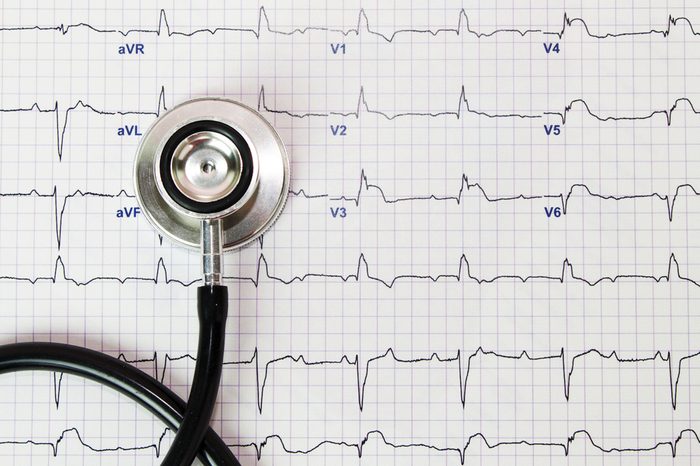
Cardiac problems
Losing heart muscle may not be the only heart-associated risk with the keto diet, Derocha says. “If you have high blood pressure and are taking medication, the prescription mixed with the diet may cause abnormally low blood pressure test results,” Derocha says. Before you start the keto diet, she suggests you talk with your doctor to avoid low blood pressure, which can be dangerous, even deadly. Watch out for these silent signs of heart trouble.
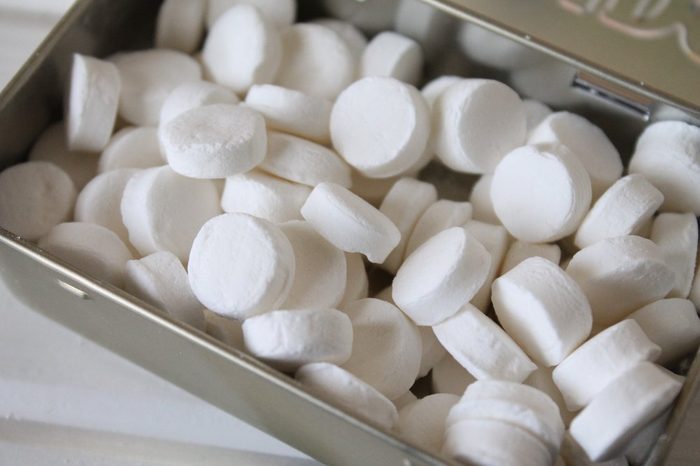
Bad breath
During ketosis, your body produces ketones, or byproducts of the fat-burning process. Your body uses several tactics to remove the ketones from your body, including exhalation. When ketones are excreted by your lungs, they leave as foul-smelling acetone. Because of this fat-burning process, you may develop bad breath while you’re in ketosis. Drink plenty of fluid to help your mouth stay hydrated and reduce the risk for bad breath. If the situation becomes particularly smelly, you can turn to sugar-free mints or gum to mask the situation. Next, find out the worst eating habits for diabetes.
